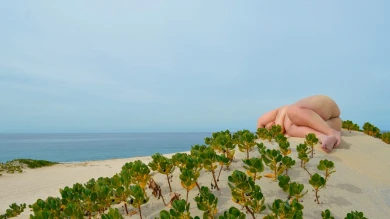-
Thursday, 29 June 2023
Documents 26. Queer Before Queer
Documentary Archaeologies in Archivo Arkhé
TicketsThis latest edition of Documents includes a conversation on the experience of Archivo Arkhé in recovering the historical memory of LGBT prior to 1969 and a visit to its new premises in Madrid. Founded in 2016 in Bogotá by Halim Badawi and Pedro Felipe Inestrosa, the space compiles publications and documents related chiefly to Latin American art and queer subject matter. Thus, Archivo Arkhé looks to establish itself as a documentation centre which is accessible to researchers interested in one or more of its strands, as well as granting visibility to its holdings via temporary exhibitions.
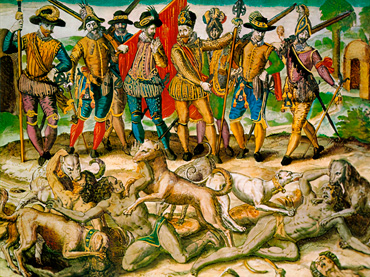
-
Friday, 30 June 2023 Nouvel Building, Protocol Room
I Declare Myself a Transvestite on Four Stages
Multimedia Performance by Frau Diamanda
In this multimedia stage piece, straddling monologue, confession and the activation of body and music, artist Frau Diamanda looks to explore the mutation of transvestite identity, punctuated by questions of class and race and affected by (neo)colonisation and hyperbolic exaltation. The staging serves to execute multimedia, spoken word and live music to approach the concept of transvestiteness in a way that is immersive and expansive, moving the spectator closer to that which is considered strange or far from their day-to-day.

-
Friday, 7 July 2023 Nouvel Building, Protocol Room
Reasons and Hate. Phobic Logics in and towards LGBTIAQ+ Collectives
Round-table Discussion
Hate and fear run through our bodies, minds, actions and discourses in different ways and from different angles as a symptom and consequence of violence which is inherited and reactivated in the present. Today, we are witness to spiralling phobia which tends to flood social space, driving out difference and stopping other types of affects from germinating. This round-table discussion features the participation of Ballet Djédje, Demetrio Gómez, Elena Prous, Tatiana Romero Reina and Iki Yos Piña, the voices of different agents hit hard by these logics of hate and fear and who refuse to assume the role of victim that pushes them aside and threatens to absorb the energy and capacity to evolve and build other ways of relating.
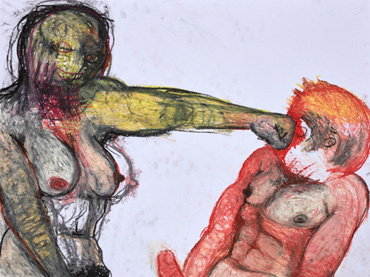
-
28 October – 16 December 2023 Nouvel Building, Workshops, Protocol Room, and Floor 5, Study Centre
Bodies that Are Not One. Fat Practices on the Border
Study Group
RegistrationThe eight sessions in this study group coordinated by Lucrecia Masón and Tatiana Romero seek a place of knowledge in the body to, from the border — as materiality and not metaphor — set in motion a series of provocations where “fat practices” (artistic, theoretical, political) look to interrupt that which is imposed upon us as universal.
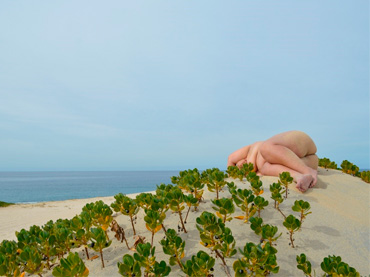
Phobia: Politics of Hate and Fear in and towards LGBTIAQ+ Collectives
LGBTIAQ+ Programme 2023
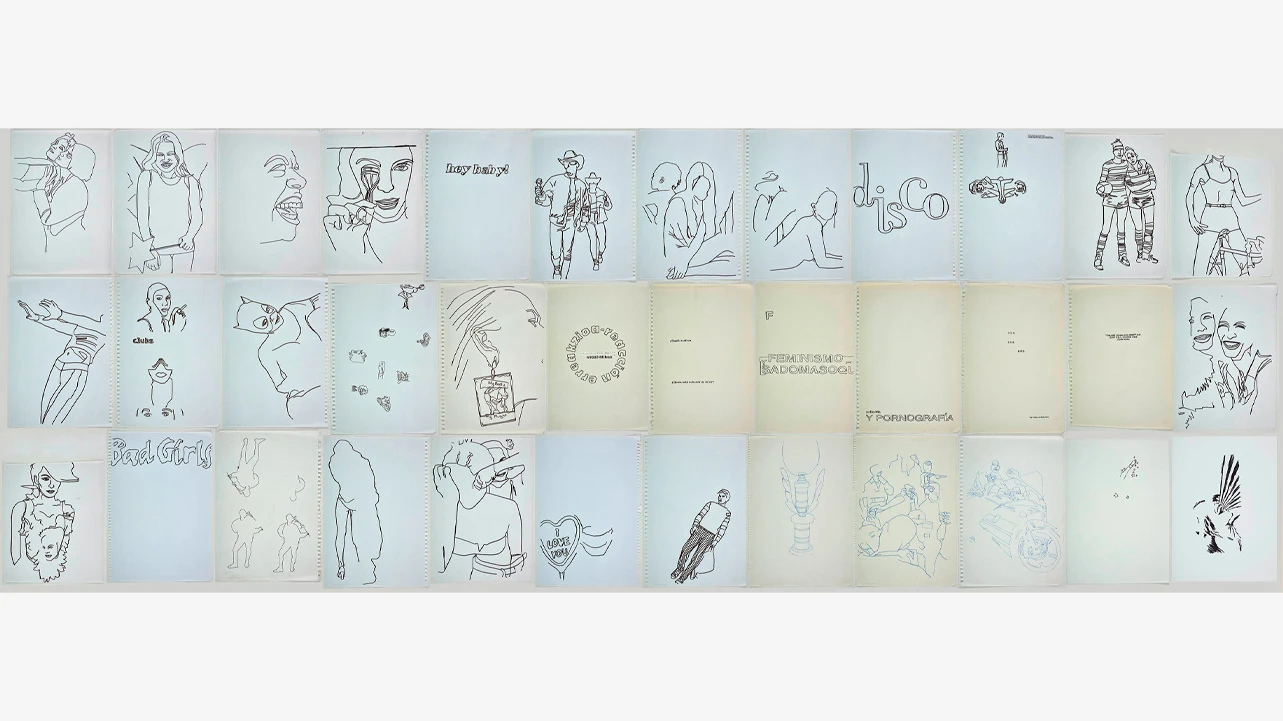
Held on 29 Jun 2023
This fresh edition of the LGBTIAQ+ programme looks to explore the possibility of imaginatively and politically turning around the logics of hate and fear that run through us, socially raising questions around who personifies a non-normative sex-gender or body position. Thus, the programme endeavours to steer clear at once of victimisation which non-critically takes on a “phobic” logic determining it and any attempt at naïve “solutionism” ignoring the deep-seated roots of violence.
The activities here examine different cases of phobic violence, primarily the struggles that are structured despite and opposite them. They are carried out from contemporary debate, assembling agents which lead these debates in the present: from archive, ranging across and reactivating traces and documents with a decades-long scream for freedom in contexts of repression and extreme persecution; from the performance of the body, a living archive of these forms of violence and resistance; and from the collective exploration of new artistic and political imaginaries by convening a study group.
[dropdown]
The suffix -phobia pervades many of the terms that designate modes of social discrimination in non-normative sex-gender bodies and identities: lesbophobia, transphobia, homophobia, sissyphobia, fatphobia, and so on, terms that also align with others, such as xenophobia or aporophobia, and share the same semantic structure.
Although the literal meaning of phobia is “fear”, its meaning has shifted to become associated with a compulsive and irrational aversion to the “other”, whereby we perceive a threat to our integrity as individuals and as a community. Opposite that which we have a phobia towards we simultaneously flee and respond, deploying mechanisms of expulsion and destruction.
It has been forever present in the beginnings of every community, yet a culture of phobia is gaining ground in the organisation of social space for reasons stemming from the biopolitical and necropolitical matrix of contemporary populations.
Phobia feeds into discourse, shapes imaginaries and governs attitudes and behaviours which spread like wildfire through the media and on social media. Members of LGBTIAQ+ collectives are not averse to such phobias and often reproduce them with such hostility that it exposes an inner fear and hatred towards themselves.
[/dropdown]
Curator
Jesús Carrillo
Más actividades
![Tracey Rose, The Black Sun Black Star and Moon [La luna estrella negro y negro sol], 2014.](https://recursos.museoreinasofia.es/styles/small_landscape/public/Obra/AD07091_2.jpg.webp)
On Black Study: Towards a Black Poethics of Contamination
Monday 27, Tuesday 28 and Wednesday 29 of April, 2026 – 16:00 h
The seminar On Black Study: Towards a Black Poethics of Contamination proposes Black Study as a critical and methodological practice that has emerged in and against racial capitalism, colonial modernity and institutional capture. Framed through what the invited researcher and practitioner Ishy Pryce-Parchment terms a Black poethics of contamination, the seminar considers what it might mean to think Blackness (and therefore Black Study) as contagious, diffuse and spreadable matter. To do so, it enacts a constellation of diasporic methodologies and black aesthetic practices that harbor “contamination” -ideas that travel through texts, geographies, bodies and histories- as a method and as a condition.
If Blackness enters Western modernity from the position of the Middle Passage and its afterlives, it also names a condition from which alternative modes of being, knowing and relating are continually forged. From within this errant boundarylessness, Black creative-intellectual practice unfolds as what might be called a history of touches: transmissions, residues and socialities that unsettle the fantasy of pure or self-contained knowledge.
Situated within Black radical aesthetics, Black feminist theory and diasporic poetics, the seminar traces a genealogy of Black Study not as an object of analysis but as methodological propositions that continue to shape contemporary aesthetic and political life. Against mastery as the horizon of study, the group shifts attention from what we know to how we know. It foregrounds creative Black methodological practices—fahima ife’s anindex (via Fred Moten), Katherine McKittrick’s expansive use of the footnote, citation as relational and loving labour, the aesthetics of Black miscellanea, and Christina Sharpe’s practices of annotation—as procedures that disorganise dominant regimes of knowledge. In this sense, Black Study is approached not as a discrete academic field but as a feel for knowing and knowledge: a constellation of insurgent practices—reading, gathering, listening, annotating, refusing, world-making—that operate both within and beyond the university.
The study sessions propose to experiment with form in order to embrace how ‘black people have always used interdisciplinary methodologies to explain, explore, and story the world.’ Through engagements with thinkers and practitioners such as Katherine McKittrick, C.L.R. James, Sylvia Wynter, Christina Sharpe, Fred Moten, Tina Campt, Hilton Als, John Akomfrah, fahima ife and Dionne Brand, we ask: What might it mean to study together, incompletely and without recourse to individuation? How might aesthetic practice function as a poethical intervention in the ongoing work of what Sylvia Wynter calls the practice of doing humanness?

Intergenerationality
Thursday, 9 April 2026 – 5:30pm
This series is organised by equipoMotor, a group of teenagers, young people and older people who have participated in the Museo Reina Sofía’s previous community education projects, and is structured around four themed blocks that pivot on the monstrous.
The third session gazes at film as a place from which to dismantle the idea of one sole history and one sole time. From a decolonial and queer perspective, it explores films which break the straight line of past-present-future, which mix memories, slow progress and leave space for rhythms which customarily make no room for official accounts. Here the images open cracks through which bodies, voices and affects appear, disrupting archive and questioning who narrates, and from where and for whom. The proposal is at once simple and ambitious: use film to imagine other modes of remembering, belonging and projecting futures we have not yet been able to live.

Remedios Zafra
Thursday March 19, 2026 - 19:00 h
The José Luis Brea Chair, dedicated to reflecting on the image and the epistemology of visuality in contemporary culture, opens its program with an inaugural lecture by essayist and thinker Remedios Zafra.
“That the contemporary antifeminist upsurge is constructed as an anti-intellectual drive is no coincidence; the two feed into one another. To advance a reactionary discourse that defends inequality, it is necessary to challenge gender studies and gender-equality policies, but also to devalue the very foundations of knowledge in which these have been most intensely developed over recent decades—while also undermining their institutional support: universities, art and research centers, and academic culture.
Feminism has been deeply linked to the affirmation of the most committed humanist thought. Periods of enlightenment and moments of transition toward more just social forms—sustained by education—have been when feminist demands have emerged most strongly. Awareness and achievements in equality increase when education plays a leading social role; thus, devaluing intellectual work also contributes to harming feminism, and vice versa, insofar as the bond between knowledge and feminism is not only conceptual and historical, but also intimate and political.
Today, antifeminism is used globally as the symbolic adhesive of far-right movements, in parallel with the devaluation of forms of knowledge emerging from the university and from science—mistreated by hoaxes and disinformation on social networks and through the spectacularization of life mediated by screens. These are consequences bound up with the primacy of a scopic value that for some time has been denigrating thought and positioning what is most seen as what is most valuable within the normalized mediation of technology. This inertia coexists with techno-libertarian proclamations that reactivate a patriarchy that uses the resentment of many men as a seductive and cohesive force to preserve and inflame privileges in the new world as techno-scenario.
This lecture will address this epochal context, delving into the synchronicity of these upsurges through an additional parallel between forms of patriarchal domination and techno-labor domination. A parallel in which feminism and intellectual work are both being harmed, while also sending signals that in both lie emancipatory responses to today’s reactionary turns and the neutralization of critique. This consonance would also speak to how the perverse patriarchal basis that turns women into sustainers of their own subordination finds its equivalent in the encouraged self-exploitation of cultural workers; in the legitimation of affective capital and symbolic capital as sufficient forms of payment; in the blurring of boundaries between life and work and in domestic isolation; or in the pressure to please and comply as an extended patriarchal form—today linked to the feigned enthusiasm of precarious workers, but also to technological adulation. In response to possible resistance and intellectual action, patriarchy has associated feminists with a future foretold as unhappy for them, equating “thought and consciousness” with unhappiness—where these have in fact been (and continue to be) levers of autonomy and emancipation.”
— Remedios Zafra

ARCO2045. The Future, for Now
Saturday 7, March 2026 - 9:30pm
The future, its unstable and subjective nature, and its possible scenarios are the conceptual focus of ARCOmadrid 2026. A vision of the future linked to recent memory, a flash of insight into a double-edged sword. This year's edition, as in the previous two, will once again hold its closing party at the Reina Sofia Museum. This time, the star of the show is Carles Congost (Olot, Girona, 1970), one of the artists featured in the new presentation of the Collections recently inaugurated on the 4th floor of the Sabatini Building.
Carles Congost, with his ironic and timeless gaze, is responsible for setting the tone for this imperfect future, with a DJ session accompanied by some of his works in the Cloister on the first floor of the Sabatini Building of the Museo on the night of Saturday 7 March.

27th Contemporary Art Conservation Conference
Wednesday, 4, and Thursday, 5 March 2026
The 27th Contemporary Art Conservation Conference, organised by the Museo Reina Sofía’s Department of Conservation and Restoration, with the sponsorship of the Mapfre Foundation, is held on 4 and 5 March 2026. This international encounter sets out to share and debate experience and research, open new channels of study and reflect on conservation and the professional practice of restorers.
This edition will be held with in-person and online attendance formats, occurring simultaneously, via twenty-minute interventions followed by a five-minute Q&A.
